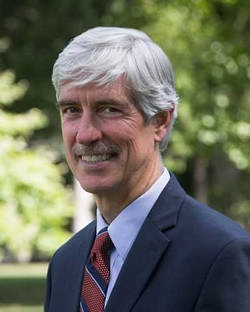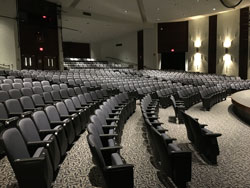Revised Program Allows for More Student Teaching Experience
 John Henning, Ph.D., Dean of the School of Education, has been designing a residency program that will give students the skills they need to thrive as teachers, as well as changing the way they are seen in their field.
John Henning, Ph.D., Dean of the School of Education, has been designing a residency program that will give students the skills they need to thrive as teachers, as well as changing the way they are seen in their field.
The pilot program started three years ago, when New Jersey changed its student teaching requirement. As of 2015, student teaching, a major requirement for graduation, was a year-long field experience, rather than lasting only a semester. Henning saw this change as a chance for him to create a more innovative blueprint for the University’s education program.
Henning expanded the idea to start during students’ sophomore year, leading to exposure on a more regular basis. In the program, students will start going out to their respective residency sites one day a week, building up to being in the classroom every day during their senior year.
“The longer [students] are in the field, the more flexible and spontaneous they get,” said Henning, who had been an English teacher for over 20 years before taking on an administrative role. “They’ve seen more, and practice more things so that things come to them automatically.”
According to Henning, students will be able to take on different roles in the classroom, such as working as a tutor, a paraprofessional, a co-teacher, and/or a summer school teacher. These varied roles will give students a taste of teaching in different content areas, as well as working with different grades and learning abilities.
According to Wendy Harriot, Ph.D., Associate Dean of Education, exposure to varied types of students will help future teachers have a better understanding of their students’ needs, and can lead to interest in a specialized field of education.
“By being in the field longer and in probably more classrooms they can gain a better understanding [the needs] of students with disabilities,” Harriot said. “It sometimes sparks an interest in the field of special education so sometimes it might even lead to a different career path.”
During their time in the classroom, students are now able to gain a stipend for their time. Henning was able to create a payment plan for undergraduates using extra money in the budget from substitute teachers and paraprofessionals with the help of representatives from the state.
Students also gain the ability to build a rapport with seasoned teachers and districts. The extra time spent in the schools allows students to get to know the teachers they’re shadowing on a deeper level and foster a mentorship between the two. Teaching is a profession that is motivated by collaboration. By being in the classroom at such an early time in their college careers, students are able to witness this co-worker dynamic and have the opportunity to join in as well.
Kelly Schuld, a sophomore who was one of the first students in the pilot residency program, commented on the difference she feels the program has made in her preparation for the profession.
“I thought I would be placed in a classroom in my school, but it turns out I was placed in a hallway,” said Schuld, who is currently completing her first residency placement at Middletown High School North in a world history class.
“It is easy to bounce between classes when the host-teacher has a free block or I want to observe the same topic presented by a different teacher,” Schuld said. “All the teachers know each other and it’s interesting to see the interconnectedness between teachers because you don’t see it so much as a student. Each teacher seems a lot more isolated in the classroom as a student, but it’s actually a lot more fluid.”
“The reason why this [program] is working is our students want to be in school,” Henning added. “It’s their energy and willingness to spend extra time gaining experience to become better teachers.”
John Henning, Ph.D.
Dean of the School of Education
John Henning, Ph.D., is an experienced educational practitioner, researcher, and leader with 38 years in the field. His primary research interests include practice-based teacher education, teacher development, instructional decision-making, and classroom discourse. These interests developed from more than twenty years of experience as a high school teacher.
Dr. Henning is an active scholar and researcher, with more than 50 publications, including three books, over thirty referenced journal articles, and seven book chapters. Henning also taught several doctoral courses, including a course entitled “Writing to Publish,” and his students have published over 25 articles.
IMAGE TAKEN from monmouth.edu; information from monmouth.edu.



